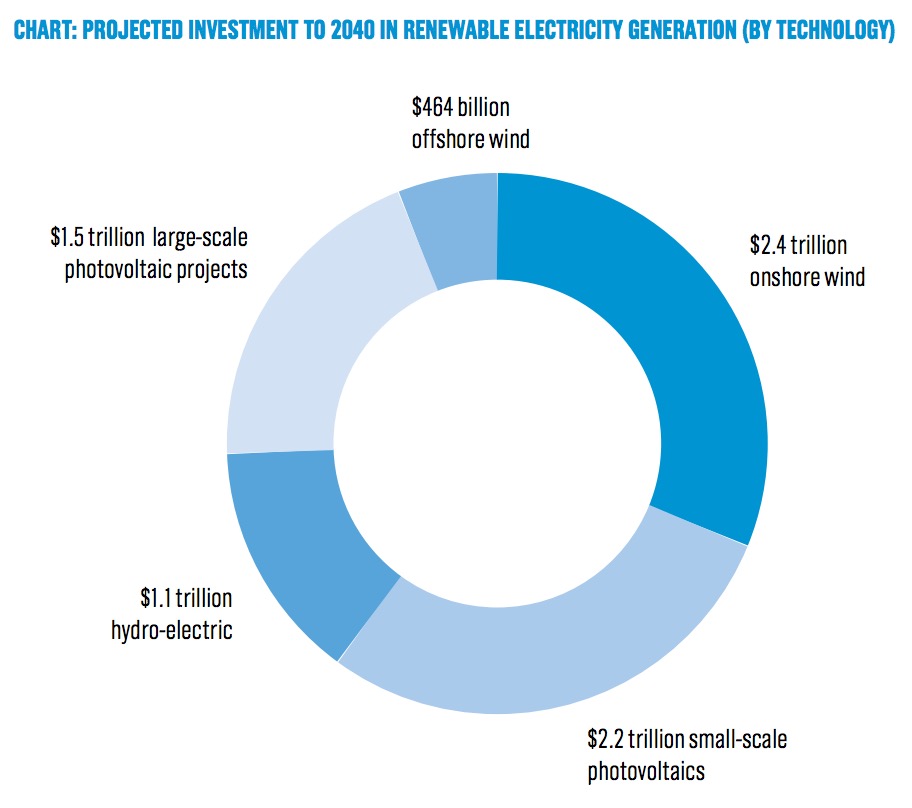THE CLIMATE GROUP
Introduction
In 2014, half of all new power capacity was from renewable sources. Renewables now generate 22.8% of all global electricity use – and this is set to grow further still. Looking at economic data, changing policy, power capacity patterns and global demand, we can see that there are multiple reasons for this inevitable shift to renewable sources of power generation.
Good economic sense
The cost of renewable power technologies is continuing to drop, which is strengthening the economic case for switching to renewable power. Analysis by Bloomberg New Energy Finance indicates that $8 trillion – two thirds of the total spent on new power generation capacity between now and 2040 – will be invested in renewable energy technologies. Estimations indicate the following breakdown:
Part of this forecast is based on the incredible price competitiveness of solar and wind. It is anticipated that by 2030 it will be cheaper to choose wind and solar than coal or gas in most countries. It is also expected that project costs of solar will fall by 47% and wind by 32% by 2040. The cost benefits alone will eventually ensure renewables are the first choice for investment in new power generation.
Tackling climate change
Switching to renewable sources of power generation is a straightforward way to cut greenhouse gas emissions. Roughly a third of all CO2 emissions and a quarter of global greenhouse gas emissions are from electricity and heat.
The International Energy Agency projects that by 2030, 42% of electricity will need to be supplied by renewables, increasing to 57% in 2050, to stay within a 2 degree Celsius average global warming threshold. This means between now and 2030 the world needs to double its current renewable power capacity.
In December 2015, the Paris Agreement set global sights on a more ambitious 1.5 degree Celsius path, making further acceleration of renewable electricity critical.
Increased demand for renewables
Electricity users have not typically been part of the decision making process in development of new infrastructure or new grid based capacity. However, as major companies have taken a leadership position on climate change they are switching to renewable forms of energy – including electricity. This will help them to reach their own carbon reduction targets.
There are now an increasing number of companies, investors, cities and citizens that have set renewable power targets and this is driving change in the market place. Electricity utilities and policymakers now need to consider the source of electricity that is wanted – not just the quantity, location or timing.
Supportive policy
In 2015, at least 164 countries had renewable energy targets, and an estimated 145 countries had renewable energy support policies in place.
Targets and policies are particularly important in emerging economies where massive investments in power generation are needed to fuel development. It is critical that economic growth is powered by renewables to avoid dangerous and expensive lock-in of fossil fuel technologies.
Bloomberg New Energy Finance estimates that of the $12.2 trillion to be invested in power generation over the next 25 years, almost 80% of it will be deployed in developing countries. Two thirds of this investment is expected to be in renewables, enabling counties to ‘leap frog’ to better technologies. This will serve emerging economies well – not only will it provide affordable power to enable economic growth, it will do so without creating the health problems or high water demand related to using fossil fuels.
Download full version (PDF): Growing Market Demand for Renewable Power
About The Climate Group
www.theclimategroup.org
The Climate Group is an award-winning, international non-profit with offices in Greater China, North America, India and Europe. Our goal is to help leaders transition to a prosperous low carbon economy, driven by the rapid scale-up of clean and renewable energy…We work in partnership with the world’s most influential business, state, regional, finance and civil society leaders. For over a decade we have worked to demonstrate the economic and business case for the low carbon economy, and create the political conditions necessary for a strong global framework that addresses climate risks and maximizes climate opportunities.
Tags: CDP, Renewables, The Climate Group, We Mean Business







 RSS Feed
RSS Feed